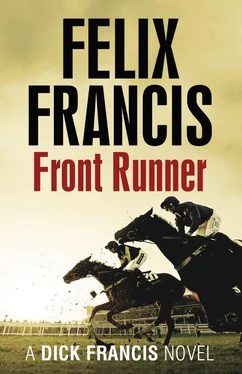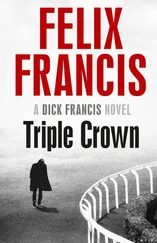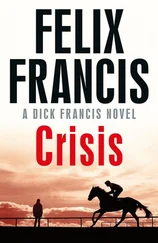‘Bill McKenzie?’ I asked one of the nursing staff, showing her my ID card.
‘He’s gone to Kingston Hospital,’ she said. ‘Possible concussion after a fall.’
‘How was he when he left here?’
‘Conscious,’ she said, ‘but confused. The doctor did some concussion tests that all showed negative but he was still slightly worried about the apparent confusion, so he sent him for a CT scan of his head, just to be on the safe side. You can’t be too sure with head injuries.’
‘Did he go in an ambulance?’ I asked.
She shook her head. ‘In a car, with my colleague.’
Why did I think that it was rather convenient for him not to have to answer any difficult questions about his fall?
‘So do you think he fell off deliberately?’
‘I’m not sure that he intended coming right off, maybe he just wanted Wisden Wonder to blunder badly and lose interest in the race. But I do think it is something worth looking at again.’
I was speaking on the phone to Paul Maldini on Saturday morning.
‘Are you going back to Sandown again today?’ he asked.
‘Yes,’ I said. ‘I thought I might.’
I actually had an invitation to lunch in a private box but I wasn’t going to tell Paul that. He’d want to know who with, and why, and I didn’t want to tell him. He might not have approved.
‘Is McKenzie riding at Sandown today?’ Paul asked.
‘That depends on whether the scans showed anything. He’s still down in the Racing Post to ride but he won’t be if he was concussed yesterday.’
All jockeys are stood down from riding for at least a week with concussion, often longer.
‘Will you speak to him if he’s there?’
‘That’s up to you,’ I said. ‘I’m not sure that I should. If there was something dodgy about that race, do we want to show our hand just yet, or do we want to investigate further on the quiet? McKenzie will know immediately that something’s up if I question him and he would most likely then tell Morris. At the moment, I think we can assume that neither of them believes we are suspicious about that race, and I’d really like to keep it that way.’
‘Why is that so important?’ Paul would have gone straight in and questioned Leslie Morris and Bill McKenzie, maybe even calling them in to a disciplinary panel in the offices at High Holborn.
‘The tip-off we received stated only that Morris was placing bets for a friend who was excluded. We don’t know who his friend is. If we alert Morris now, then it becomes far more difficult for me to find out. He would simply go to ground and cover his tracks. We would have no case.’
‘But he might do it again,’ Paul said. ‘The BHA can’t be seen to allow something that’s against the Rules of Racing to happen for a second time, not when we know already it’s happened before.’
‘Then I’d better catch him quickly.’
‘OK,’ he said slowly, as if not fully convinced. ‘You do as you think best for the moment. And keep me informed.’
‘Will do.’
‘And you also believe the betting on the race was suspect?’
‘I certainly do,’ I said. ‘As far as I can tell, Morris backed every horse in the race except Wisden Wonder, which was the six-to-four favourite.’
‘Mmm, that does sound rather dubious.’
‘I think it sounds considerably more than rather dubious,’ I said. ‘It sounds positively dishonest.’
‘Do we need to send in the police?’
‘No,’ I said quickly, ‘not yet. We need to be sure before we do anything.’ Paul was again for jumping in with both feet. ‘If we call in the police I won’t be able to investigate anything further — they wouldn’t allow it. And we don’t want another high-profile race-fixing trial to collapse from lack of evidence. I’m not even a hundred per cent sure that Morris did back everything except Wisden Wonder. The bookies were not that helpful.’
‘They never are.’
Paul didn’t like bookmakers although he had to admit that, without any betting, racing would surely die.
It was the gambling public that ultimately delivered the revenue on which the sport depended. Everyone was trying to back a winner, but it was the losers we relied on.
The only sure way of backing a winner was to bet on every horse running in the race, but that approach was unlikely to make you any profit.
Suppose you want to end up with a return of a hundred pounds.
On a horse quoted at four-to-one, you would win four pounds for each one you stake, provided the horse won the race. So, if you bet twenty pounds with a bookmaker, you would win eighty. You would also get back your stake of twenty, hence the bookmaker would pay out one hundred pounds.
If the horse was at nine-to-one, you would need to bet ten pounds on it so that, if it comes in first, you win ninety pounds, plus your stake of ten, giving you the hundred you want. For a horse at odds of six-to-four, you would win six pounds for every four pounds you bet so, if you staked forty pounds and it won, you would win sixty. Add back your stake of forty and you would have your return of a hundred.
In this way, you can calculate how much you would need to bet on each horse to have one hundred pounds in your hand after the race.
It sounds simple.
However, there is a major snag.
In order to be sure of having a hundred pounds after the race, you would have to bet more than a hundred pounds in the first place. You would always back the winner but you would lose money each time. In fact, you would have to bet, on average, about a hundred and ten pounds on each race to receive back just a hundred.
That is how bookmakers make their money. Provided they have done their sums right and posted odds in the correct ratios to encourage an even spread of bets on all the horses, they will take in a hundred and ten pounds for every hundred they have to pay out.
This is why the odds can change as the betting continues in the minutes before the race. If a bookmaker is taking too much money on a certain horse and not enough on another, he will shorten the odds on the first horse, to deter further bets, and lengthen them on the second horse to encourage them.
No one in their right mind would stake a hundred and ten pounds on a race to get back only a hundred but, if you knew for sure that the six-to-four shot was not going to win , you wouldn’t have to bet the forty pounds on that horse. You would only have to stake seventy pounds to be certain of winning a hundred, irrespective of which of the other horses won.
Now, that looks like a good bet — in fact, it’s a sure-fire winner.
If that is what had been going on in the race at Sandown then, to end up with twenty-four thousand pounds in his coat pockets, Morris had needed to stake sixteen thousand, eight hundred pounds. That gave him a tidy profit of over seven thousand pounds on just the one race — a return on his investment of over forty per cent at a time when bank interest rates were at an historic low — and with absolutely no risk of losing his money.
No risk, that was, unless an undercover investigator like me had spotted what was going on.
Sandown Park racecourse on the first Saturday afternoon in December was heaving with people, all of them in great spirits under a sunny sky.
Tingle Creek day had finally arrived and there was huge excitement as the country’s leading two-mile chasers were set to go head-to-head. In addition, there were numerous Christmas-themed stalls and festive music provided by a band of badly dressed elves together with a scruffy Father Christmas.
On this day, I was here as myself, having put the wig, beanie hat and glasses back in the wardrobe along with the khaki chinos and the olive-green anorak. Instead, I was trying to be respectable in a suit and tie for my lunch engagement in Derrick Smith’s private box.
Читать дальше












